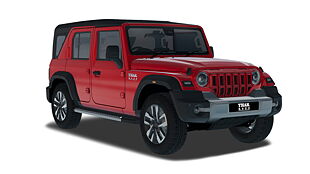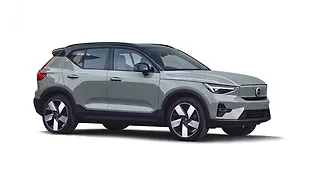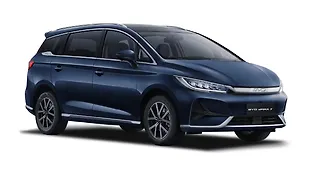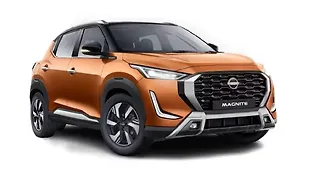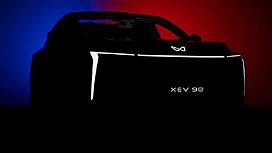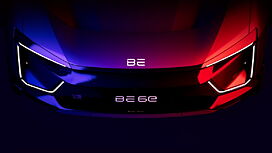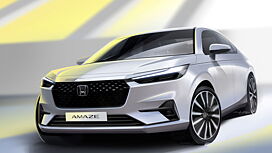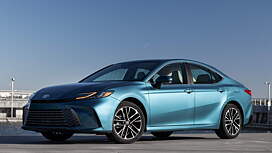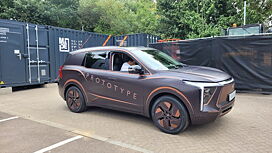Why would I buy it?
- Affordable passenger electric vehicle
- Practical city run-about; easy to drive and own
- Four-star NCAP rating and decent feature list
Why would I avoid it?
- Could have been more aggressively priced
- Misses out few feel-good features
Verdict
With the first mover’s advantage, Tata now has two electric vehicles in their line-up. Following the success of the Nexon EV, the Tigor EV comes as another viable option for someone looking to adopt an electric vehicle for their daily commutes in and around the city. It is easy to drive, practical for your everyday home-office-home commutes, and adequately powerful for some highway runs as well. It will take time to get accustomed to and surely requires planning to use the electric compact sedan to its fullest. Otherwise, it will induce some range anxiety. But the Tigor EV can easily be your first car or the only car in the family.

Engine and Performance
8 / 10

Let’s get the numbers out of the way first. Unlike the Nexon EV which gets a 30.2kWh battery pack, the Tigor EV has a smaller 26kWh liquid-cooled battery pack. It powers a front-axle mounted electric motor that produces 74bhp (55kW) and 170Nm. Although it has a smaller battery compared to the Nexon EV, the claimed range is almost identical at 306 kilometres (Nexon’s at 312 kilometres). It also has zero to 80 per cent charging capacity achievable in 65 minutes through a 25kW CC2 fast charger. A normal 15amp home plug can charge the Tigor EV from zero to 80 per cent in eight hours and 45 minutes.

To drive the Tigor EV, one has to look at the ‘Ready’ sign on the digital instrument cluster, depress the brake pedal, rotate the gear dial from N to D, and let go of the brake pedal. It’s a pretty conventional procedure so far and so is driving the Tigor EV. It drives like any other car. Get on the throttle and it responds nicely, although some might find the lack of any vibration and noise in an EV eerie. But in your everyday driving, the Tigor EV doesn’t feel out of place at any point.

One of the characteristics of the D mode is that it takes a little push to get up to speed. But with an extended right foot, you can easily get to triple-digit speed and maintain that without breaking a sweat. It’s surprising how well it manages to keep pace with traffic, be it at city speeds or out on the highway. Also, it responds fairly well to sudden throttle inputs – in case there’s a gap to wade through in traffic. But off the mark, there’s a slight hesitance from when the throttle is pressed and is lurching forward. But that’s perfectly livable and won’t be noticeable to many, especially those switching from a conventional powertrain. For everyday driving, the D mode is more than adequate. And with the judicial right foot and little help from regenerative braking, one can try to get close to the claimed range as well.

Now, this is an EV. And modern-day EVs are neck-snapping quick. Although the Tigor EV is not punch-in-the-gut quick, switch to S mode and its docile characteristic transforms real quick. In the S mode, it is eager and feels hurried instantly. There are no other changes to the driving dynamics, but the sharper throttle response is a welcome change and is enough to keep you entertained with some enthusiastic driving. In our V-box tested time, the 0-60kmph run was achieved in a fairly brisk 5.32 seconds and 100kmph came up in 12.63 seconds. For perspective, that’s Maruti Suzuki Swift territory. In roll-on acceleration, the 20-80kmph run took 6.43 seconds, while the 40-100kmph was achieved in 10.09 seconds. So, the Tigor EV is no slouch. And for someone looking for an energetic runabout, the S mode in the Tigor EV will surely make itself worthwhile. The only trade-off here will be a reduced driving range.

If we are to nitpick, the MID screen with the battery per cent and range display was either slow or inaccurate – thus inducing range anxiety which seemed feigned to an extent. Although the claimed range is above 300 kilometres, in real-world driving conditions it should be around 220-240 kilometres, given that it’s got a smaller battery compared to the Nexon EV. And when driven with a heavy foot (or enthusiastically in the S mode), the range plummets rather quickly. This is plausible in a budget car, so the owners will need to be mindful about the driving range and battery charge, and rely on their own driving experience rather than the figures on the MID. Otherwise, the Tigor EV effortlessly fits the bill for someone with a fixed driving schedule.
Ride and Handling
7 / 10

Over the standard version, the electrified Tigor didn’t seem to depart much in terms of ride and handling. We liked the slight weight added to the steering but that’s about the only noticeable change. Going almost three turns lock-to-lock, the steering is still direct with little to no lag off-centre. And during U-turns or around lock-to-lock manoeuvres, the self-centring steering is a breeze to use. There is a perceptible amount of body roll but that only comes into play when pushed hard. Otherwise, the Tigor EV changes direction and darts into small gaps in traffic with good composure.

In terms of ride quality, the Tigor EV remained unfazed through the pothole-festooned roads it trudged. Every bump and irregularity is absorbed nicely and only the sharpest of the creases were felt inside the cabin. Despite the heavier battery pack, there’s enough ground clearance to take on the bad patches of roads or badly-made speed breakers without scrapping the underbelly. At highway speeds, the ride gets even better and the high-speed stability is much better than we expected. On the flip side, the braking performance could have been better. Especially when mounting speed is easier in the EV. So, the brake’s feel and the bite could have been improved.

Interior Space and Quality
6.5 / 10

Over the standard Tigor, the electric version’s highlight inside the cabin is the circular dial replacing the gear lever. Also, there are electric-blue highlights around the air vents and on the digital instrument bezel along with Tata’s tri-pointed design in the blue-hue on the seat’s upholstery. These are the only few things that set the Tigor EV apart from the standard version. But then, this also makes everything inside the cabin feel familiar and conventional to use.

The fit and finish of the cabin are, in typical Tata fashion, adequate and feel built-to-last. Although soft-touch plastic at some points would have elevated the cabin's ambience by a considerable margin. Space-wise, there are no complaints either – another Tata trait. There’s ample head and shoulder space with seats offering a good amount of support. On to the centre console, the seven-inch touchscreen is integrated with Tata’s new ZConnect connectivity feature. This is a new system that offers all the new-age connectivity and smartphone telephony with the addition of EV requirements like charging point locator, OTA updates, DTE, and battery status display.

As for the rear seats, the compact sedan offers a good amount of knee space but taller passengers might find their heads touching the roof. And sitting three abreast here for longer jaunts would be a tight affair too. You do get a centre armrest but rear air vents or backseat pockets are absent – which is a surprising miss out. Although, there are non-adjustable headrests and they offer decent support.

Lastly, we come to the boot space. Accommodating a battery pack below, the spare wheel is tucked vertically inside the boot. There’s a square bag carrying the charging cable, stowed in the boot as well. Even the boot floor is slightly raised reducing the overall space to 316-litres. But it still isn’t bad by the segment standards and could gulp in a small suitcase and couple of duffle bags with ease.
Features and Equipment
6.5 / 10

This range-topping XZ+ variant comes loaded with features like projector headlamps with sharp-looking LED DRLs, alloy wheel-styled wheels and wheel cover, Harman-sourced infotainment system with four speakers and tweeters, smart key with start-stop button, cooled glove-box, electric boot, and auto-folding ORVMs apart from the digital instrument cluster, auto AC, and all four power windows. In terms of safety, it gets ABS with EBD and CSD, dual airbags, rear parking sensors, seat-belt reminder system, speed alert system, speed-sensing auto door lock, rear parking camera, and most importantly – four-star NCAP safety rating.

But the fact that its price ranges into a C-segment sedan territory, we expected some more feel-good features in the Tigor EV like ambient lighting, wireless charger, sunroof, rear AC vents, ISOFIX, and more airbags.
Conclusion
7 / 10

Tata could have priced the Tigor EV even more aggressively thus pulling the heartstrings of more buyers looking for a city runabout that’s also lighter on the pocket. But the Tigor EV prices start at Rs 11.99 lakh (ex-showroom, India) and for the top-spec trim, it's Rs 13.14 lakh. Of course, the state-wise subsidy might see a variance (or lowering to an extent) in this price. But for what it’s worth, the pricing of the Tigor EV makes the Nexon EV look more value for money. That’s the only complaint we have about the otherwise well-thought-out, well-put-together Tigor EV.

The Indian carmaker is confident in the Tigor EV’s apparent characteristics like lower running cost and high safety rating to attract more buyers. Especially the ones looking for early adoption into electrification. Whether the showroom footfalls remain with the Tigor EV or they put in a little extra money and get themselves the Nexon EV remains to be seen. But the Tigor EV in itself comes across as a viable and affordable offering with no direct rivals – making it difficult not to recommend.
Pictures by Kaustubh Gandhi

![टाटा टिगोर ईवी [2021-2022] ठीक सामने तीन चौथाई टाटा टिगोर ईवी [2021-2022] ठीक सामने तीन चौथाई](https://imgd.aeplcdn.com/642x361/n/cw/ec/103105/right-front-three-quarter0.jpeg?isig=0&wm=1&q=80)
![टाटा टिगोर ईवी [2021-2022] ठीक सामने तीन चौथाई टाटा टिगोर ईवी [2021-2022] ठीक सामने तीन चौथाई](https://imgd.aeplcdn.com/642x361/n/cw/ec/103105/tata-tigor-ev-right-front-three-quarter1.jpeg?isig=0&wm=1&q=80)
![टाटा टिगोर ईवी [2021-2022] ठीक सामने तीन चौथाई टाटा टिगोर ईवी [2021-2022] ठीक सामने तीन चौथाई](https://imgd.aeplcdn.com/642x361/n/cw/ec/103105/tata-tigor-ev-right-front-three-quarter4.jpeg?isig=0&wm=1&q=80)
![टाटा टिगोर ईवी [2021-2022] ठीक सामने तीन चौथाई टाटा टिगोर ईवी [2021-2022] ठीक सामने तीन चौथाई](https://imgd.aeplcdn.com/642x361/n/cw/ec/103105/tata-tigor-ev-right-front-three-quarter8.jpeg?isig=0&wm=1&q=80)
![टाटा टिगोर ईवी [2021-2022] राइट रियर थ्री क्वार्टर टाटा टिगोर ईवी [2021-2022] राइट रियर थ्री क्वार्टर](https://imgd.aeplcdn.com/642x361/n/cw/ec/103105/tata-tigor-ev-right-rear-three-quarter3.jpeg?isig=0&wm=1&q=80)
![टाटा टिगोर ईवी [2021-2022] पीछे का व्यू टाटा टिगोर ईवी [2021-2022] पीछे का व्यू](https://imgd.aeplcdn.com/642x361/n/cw/ec/103105/tata-tigor-ev-rear-view10.jpeg?isig=0&wm=1&q=80)
![टाटा टिगोर ईवी [2021-2022] लेफ्ट रियर थ्री क्वार्टर टाटा टिगोर ईवी [2021-2022] लेफ्ट रियर थ्री क्वार्टर](https://imgd.aeplcdn.com/642x361/n/cw/ec/103105/tata-tigor-ev-left-rear-three-quarter2.jpeg?isig=0&wm=1&q=80)
![टाटा टिगोर ईवी [2021-2022] लेफ्ट रियर थ्री क्वार्टर टाटा टिगोर ईवी [2021-2022] लेफ्ट रियर थ्री क्वार्टर](https://imgd.aeplcdn.com/642x361/n/cw/ec/103105/tata-tigor-ev-left-rear-three-quarter9.jpeg?isig=0&wm=1&q=80)
![टाटा टिगोर ईवी [2021-2022] इमेज टाटा टिगोर ईवी [2021-2022] इमेज](https://imgd.aeplcdn.com/272x153/n/cw/ec/45849/tigor-ev-facelift-exterior-right-front-three-quarter-5.jpeg?isig=0&q=80)




